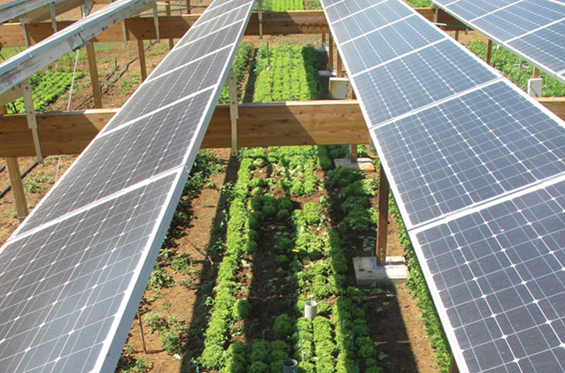Agro-Voltaic Solutions: A Holistic Approach
Agro-voltaic systems combine solar energy generation with agricultural production, optimizing land use while addressing the water-food-energy nexus. By integrating solar panels into farmlands, we enable farmers to generate clean energy for irrigation, processing, and storage while maintaining productive agricultural activities beneath the panels. These systems also reduce water evaporation, enhance soil moisture retention, and create a microclimate that supports crop growth.
At OBA Global Citizens, we are committed to implementing agro-voltaic projects that empower farmers, reduce dependency on fossil fuels, and enhance food production. Our approach fosters climate resilience, improves rural livelihoods, and promotes a circular economy where water, energy, and food systems work in harmony.
SolarSprout: Solar-Powered Irrigation for Smallholder Farmers


We integrate solar energy with irrigation systems, enabling farmers to access clean and affordable water for agriculture.
How It Works:
- Solar panels generate electricity to power water pumps.
- The system provides controlled and efficient irrigation to farms.
- Water distribution is automated, reducing water wastage.
Impact:
- Reduces reliance on expensive fossil-fuel-powered pumps.
- Provides affordable and sustainable water access to farmers.
- Improves agricultural yields in water-scarce areas.
SunSpring:
Energy-Water Link for Rural Communities


We install agro-voltaic systems, where solar panels generate electricity while also shading crops, improving both energy access and food production.
How It Works:
- Solar panels are placed above agricultural fields, providing energy while protecting crops from excessive heat.
- The electricity powers water filtration systems and food processing units.
- Excess energy is stored in batteries or mini grids for community use.
Impact:
- Enables off-grid communities to have access to both clean water and power.
- Reduces water evaporation and improves food production.
- Creates a sustainable model for rural energy supply.
Smart Water Project:
OBA Water ATM
The Problem: Nigeria’s Water Crisis

Access to clean and safe drinking water remains a major challenge in Nigeria, with over 60 million people lacking reliable water sources. The existing water infrastructure struggles to meet the demands of both rural and urban communities, leading to serious public health concerns.
Water Scarcity & Unreliable Supply
- Many communities rely on inconsistent municipal water supply or expensive private alternatives.
- Rural areas often lack piped water systems, forcing residents to walk long distances to fetch water.
High Costs & Inefficiency in Water Distribution
- Conventional water distribution models do not serve low-income communities effectively, making clean water a luxury rather than a necessity.
- The cost of bottled water and tanker supply is too high for many households, leading to reliance on untreated water sources.
Health Risks from Contaminated Water Sources
- Many people depend on polluted rivers, streams, and boreholes, leading to outbreaks of waterborne diseases such as cholera, typhoid, and dysentery.
Lack of proper water treatment exposes millions to life-threatening illnesses.
Our Solution
OBA Water ATM – Affordable, Safe, and Accessible Water

At OBA Global Citizens, we are tackling Nigeria’s water crisis through the OBA Water ATM, an innovative smart water distribution system that provides affordable, clean, and safe drinking water to underserved communities.
Our OBA Water ATMs are self-service kiosks where people can access safe drinking water at low costs. These ATMs ensure that water is available 24/7, reducing dependence on unreliable and unsafe sources.
How It Works:
- Users purchase or recharge smart cards or mobile payment accounts to access filtered drinking water at designated OBA Water ATM kiosks.
- The ATMs are strategically installed in rural villages, urban slums, and public areas, ensuring wide coverage.
- The system operates 24/7, allowing people to fetch water at their convenience.
- Water quality is constantly monitored using real-time smart technology to ensure safety and hygiene.
Impact of the OBA Water ATM System:
- Reduces reliance on unsafe water sources by providing affordable clean water in high-need areas.
- Improves public health by minimizing waterborne diseases, especially in children and vulnerable populations.
- Makes clean water accessible to low-income communities, eliminating financial and logistical barriers.
- Uses smart monitoring technology to maintain water quality and system efficiency.
Scaling Impact: Expanding Clean Water Access Across Nigeria
At OBA Global Citizens, we aim to scale our smart water solutions by:
- Partnering with local governments, NGOs, and international donors to install more OBA Water ATMs across Nigeria.
- Incorporating solar-powered ATMs for sustainable, off-grid water supply.
- Expanding mobile-based cashless payment options to improve access in low-income communities.
- Advocating for smart water policies and innovations to address Nigeria’s water crisis on a national level.